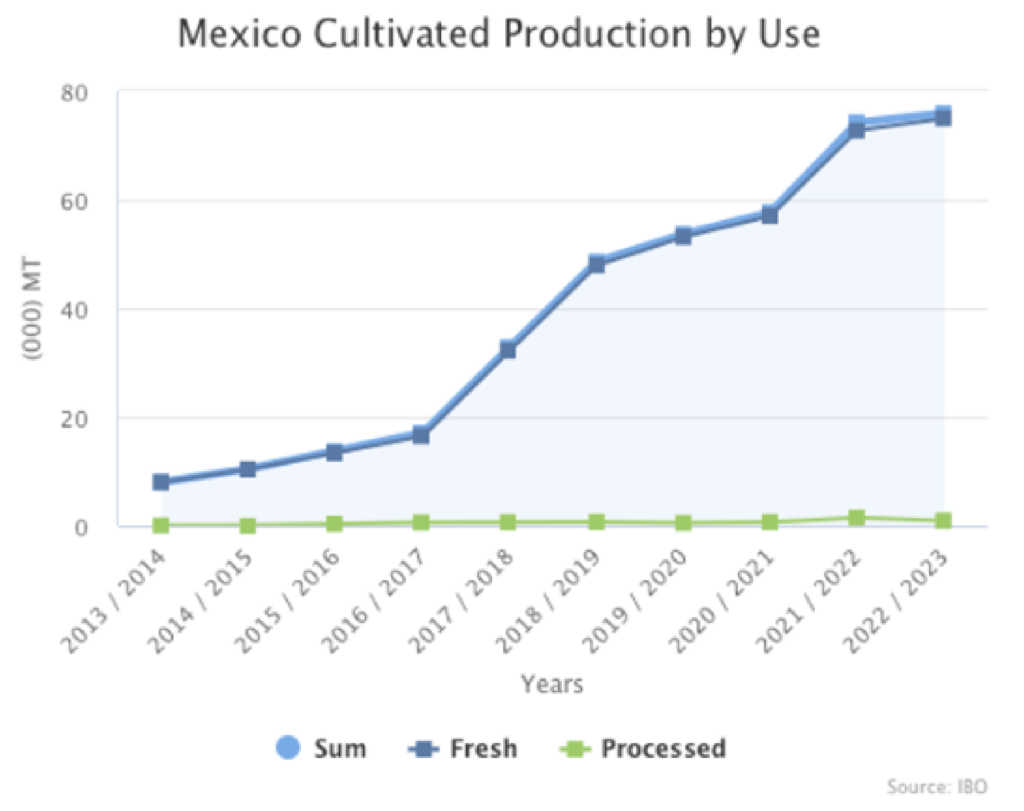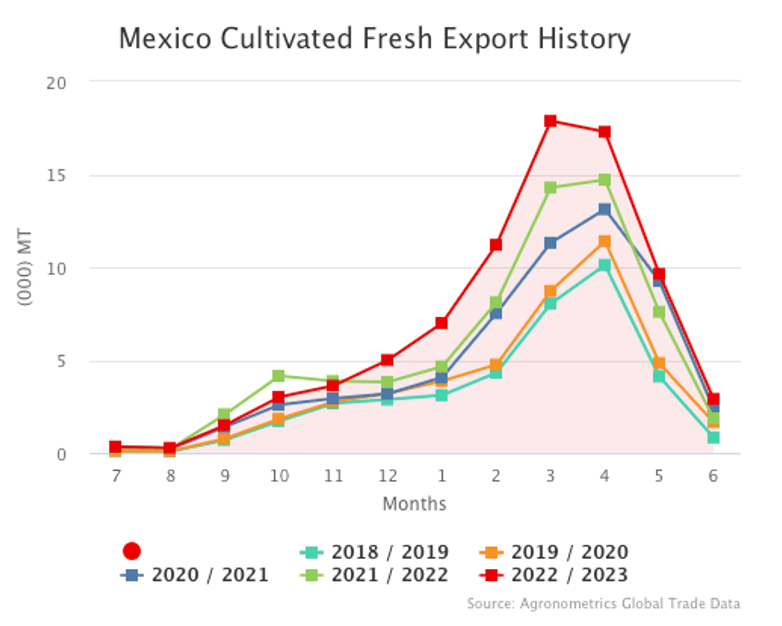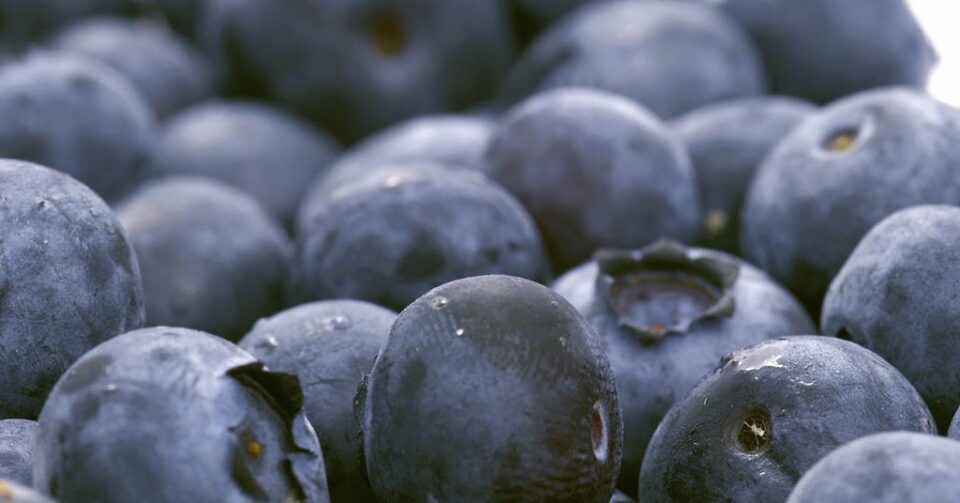The Mexican blueberry industry stands at the intersection of quality cultivation, market proximity, and sustainable practices, positioning itself as a prominent player in the global blueberry market. Varietal replacement plays a pivotal role in shaping the Mexican blueberry industry, offering consumers high-quality fruit with distinctive flavors. Notably, the Mexican Biloxi variety exhibits a flavor profile distinct from its Peruvian counterpart, a difference attributed to the influence of microclimates, altitude, and latitude. The favorable conditions in Mexico contribute to the production of high-quality fruit, a hallmark of the country’s reputation on the global stage.
One of Mexico’s strongest advantages in terms of its blueberry market is its geographic proximity to North America, Internationalblueberry notes. This strategic location allows for efficient and timely transportation of berries to the U.S. and Canada, with the capability to ship fruits within two to five days, Mexico gains a competitive edge over other origins, such as South America, enabling a consistent and rapid supply to meet market demands.
The Mexican blueberry industry operates within a distinct seasonal window, moving from winter into spring, capitalizing on the limited availability of fruit during this period. Despite facing weather challenges in the current season, including the impact of a hurricane in Sinaloa, the industry remains resilient, anticipating a regular season overall. The robust growth experienced in previous seasons has tapered off slightly, with projections suggesting a steady expansion between 5% and 10% annually.
“I anticipate that Mexico will sustain a growth rate ranging between five and ten percent annually. Specifically for the current season, expectations are for a regular performance, barring any significant disruptions, notably in Sinaloa, which faced challenges earlier in the year. However, the central region of Mexico, constituting two-thirds of the national crop, appears to be operating within expected parameters. In the preceding season, Mexico achieved an export volume of approximately 80,000 tons. Should the projected growth rate of 10% materialize, it implies an export range between 88,000 and 90,000 tons for the upcoming season,” says an industry source.
Read also: Water management will be a challenge for upcoming Moroccan blueberry season
Mexico is witnessing a transition in blueberry varieties, moving away from standard options like Biloxi towards premium varieties. This shift is driven by the need for better yields, improved genetics, and an enhanced consumer experience. Efforts to increase variety diversification involve collaboration with esteemed breeders, ensuring that new plantations prioritize premium varieties proven to excel both in the field and in the market.

The primary regions for blueberry production in Mexico are Jalisco, ranking as the foremost producer, followed by Sinaloa, situated to the north of Mexico, and Michoacán. Although there are emerging cultivation areas, the predominant sources of production remain concentrated in the states of Jalisco, Sinaloa, and Michoacán, with additional plantations in states like Guanajuato, Puebla, and Baja contributing to a lesser extent.
The dynamics of the blueberry market are influenced by global players, with Peru emerging as a significant contributor. Changes in Peru’s production pattern this season, due to the El Niño phenomenon, have reverberations across the industry. Mexico, adapting to these shifts, is navigating challenges by optimizing its production timing and ensuring a robust supply to meet market demands.
 Looking ahead, the Mexican blueberry industry envisions sustained growth, not only in volume but also in terms of sustainability. Key goals include maintaining a focus on genetics, ensuring year-round supply, and adopting technological advancements for increased efficiency. The industry aims to differentiate itself by promoting environmentally friendly practices, such as organic techniques, solar energy utilization, and responsible packaging choices.
Looking ahead, the Mexican blueberry industry envisions sustained growth, not only in volume but also in terms of sustainability. Key goals include maintaining a focus on genetics, ensuring year-round supply, and adopting technological advancements for increased efficiency. The industry aims to differentiate itself by promoting environmentally friendly practices, such as organic techniques, solar energy utilization, and responsible packaging choices.
While the industry celebrates its successes, it also faces challenges, including weather uncertainties, the impact of climate change, and a growing concern over labor shortages. The increased costs associated with crop production necessitate innovative solutions to maintain profitability and sustainability. The industry is cognizant of the need to remain attractive to the workforce, particularly as urbanization trends draw people away from traditional farming areas.
 Environmental and social responsibility programs are integral to the Mexican blueberry industry’s ethos. Initiatives such as incorporating organic techniques, embracing greener technologies like solar panels, and promoting recycled packaging materials underscore the industry’s commitment to reducing its ecological footprint. These endeavors align with broader sustainability goals and contribute to the industry’s responsible and ethical practices.
Environmental and social responsibility programs are integral to the Mexican blueberry industry’s ethos. Initiatives such as incorporating organic techniques, embracing greener technologies like solar panels, and promoting recycled packaging materials underscore the industry’s commitment to reducing its ecological footprint. These endeavors align with broader sustainability goals and contribute to the industry’s responsible and ethical practices.
The Mexican blueberry industry stands as a testament to the delicate balance between quality production, strategic positioning, and environmental consciousness. As it navigates global market dynamics, embraces varietal shifts, and addresses challenges head-on, the industry remains steadfast in its commitment to providing a diverse and high-quality blueberry supply to consumers while championing sustainable practices for a brighter agricultural future.
The use of the site materials is free if there is a direct and open for search engines hyperlink to a specific publication of the East-Fruit.com website.




